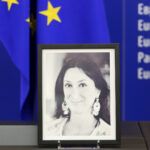While Russia deploys cyber warfare and disinformation strategies in its war on Ukraine, social platforms, and telecommunication, media and internet operators are playing an important role in relaying information on the war and shaping public opinion.
While Russia deploys cyber warfare and disinformation strategies in its war on Ukraine, social platforms, and telecommunication, media and internet operators are playing an important role in relaying information on the war and shaping public opinion. The EU has taken a number of immediate, practical, measures to support Ukraine, and is contemplating further action to build the resilience of its communications infrastructures, strengthen cybersecurity and counter disinformation.
State of play
Russia’s military aggression has largely destroyed and destabilised Ukraine’s communications infrastructure. This has been accompanied by hybrid threats, including massive disinformation campaigns and cybersecurity attacks. The work done by the EU’s East StratCom Task Force, set up to address Russia’s disinformation campaigns, shows that, since 2014, over 13 500 cases of disinformation (nearly 40 % of all cases identified) have targeted Ukraine. In recent weeks, the pro-Kremlin disinformation narrative on the situation in Ukraine has been gaining momentum; it includes a misrepresentation of the role of the North Atlantic Treaty Organization (NATO), and claims that the West is imposing censorship through state institutions and privately-owned social-media companies. Furthermore, Ukraine has suffered a string of cyber attacks in recent weeks, and concerns are also rising with regard to cyber strikes targeting the EU. The European Central Bank has gone so far as to warn European financial institutions of the risk of retaliatory Russian cyber attacks. Faced with these exceptional circumstances, the EU has acted to support Ukraine, and is exploring the need to adopt additional measures to foster the resilience of the communications infrastructure, strengthen cybersecurity and counter disinformation.
EU response
- Boosting communications infrastructure resilience. Keeping Ukraine’s telecommunications services operational is critical to ensure normal functioning of the Ukrainian government, as well as to relieve the humanitarian crisis.
- Banning Russian propaganda on its war on Ukraine. Combating war propaganda and disinformation is a particularly pressing issue in Russia’s war. The Council decided on 2 March 2022 to suspend the broadcasting activities of Sputnik and Russia Today taking place in or directed at the EU until the aggression towards Ukraine ends and Russia and its associated outlets cease to conduct disinformation and information manipulation actions against the EU and its Member States.
- Strengthening the EU anti-disinformation toolbox. The Ukraine crisis is fostering a debate on how to fend off foreign interference and disinformation more effectively. There are already proposals to increase East StratCom Task Force funding and extend the EU’s rapid alert system on disinformation to cover Ukraine and other interested parties.
- Supporting Ukraine’s fight against cyber threats. In the wake of Russia’s invasion of Ukraine, and following on from the EU/Ukraine cyber dialogue launched in June 2021, the EU Foreign Affairs Council announced on 21 February 2022 that the EU would do more to help Ukraine defend itself against cyber attacks.
- Bolstering EU cybersecurity capacities. The situation in Ukraine has also prompted the EU to reflect on how to complement its current framework to counter hybrid threats, and accelerate the pace of European cooperation to address cybersecurity challenges more effectively.
- Limiting Russia’s access to dual-use technologies. The EU sanctions adopted on 25 February 2022 intend, not least, to limit Russia’s access to crucial advanced technology.
Source: European Parliamentary







Leave a Reply